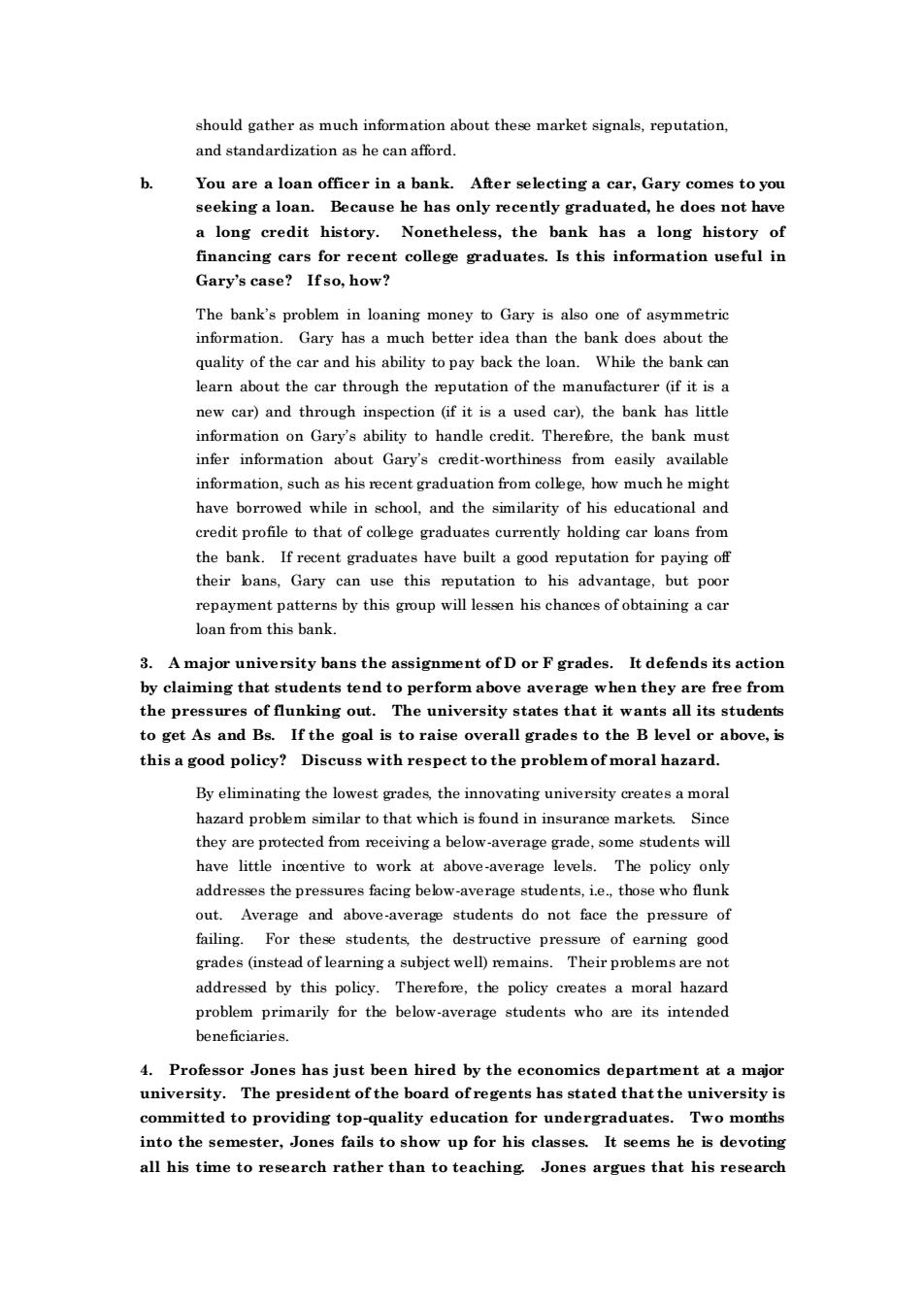正在加载图片...

should gather as much information about these market signals,reputation. and standardization as he can afford. b. You are a loan offcer in a bank.ARer seleeting a car,Gary comes to yo eeking a loa Because he has only recently graduated,he does not bav a long credit history. Nonetheless,the bank has a long history of financing cars for recent college graduates.Is this information useful in Gary's case?Ifso.how? The bank's problem in loaning money to Gary is also one of asymmetric information.Gary has a much better idea than the bank does about the ty to pay baek the e loan e the bank learn about the car through the reputation of the manufacturer (if it is a new car)and through inspection(if it is a used car),the bank has little information on Gary's ability to handle credit.Therefre.the bank must infer information about Gary's credit-worthiness from easily available information,such as his rec graduat on from colge,how much he ight have borrowed while in school,and the similarity of his educational and credit profile to that of college graduates currently holding car bans from the bank.If recent graduates have built a good reputation for paying off their bans.Gary can use this reputation to his advantage.but poor loan from this bank A major university bans the assignment of D or F grades.It defends its action by claiming that students tend to perform above average when they are free from the pressures of flunking out.The university states that it wants all its students to get As and Bs.If the goal is to raise overall grades to the B level or above,is this a good policy?Discuss with respect to the pre oblem of moral hazard. By eliminating the lowest grades,the innovating university creates a moral hazard problem similar to that which is found in insurance markets they are protected from receiving a below-average grade,some students will have little incentive to work at above-average levels.The policy only addresses the pressures facing belw-average students.ie.those who flunk out. Average and above-ave rage students do not face the pre sure of failing r th he de ruc ctive pres of rning good grades(instead of learning a subject well)remains.Their problems are not addressed by this policy.Therefore,the policy creates a moral hazard problem primarily for the below-average students who are its intended omics department at a majo niversity The p d of rege s has stated t university is committed to providing top-quality education for undergraduates. Two months into the semester,Jones fails to show up for his classes.It seems he is devoting all his time to research rather than to teaching Jones argues that his research should gather as much information about these market signals, reputation, and standardization as he can afford. b. You are a loan officer in a bank. After selecting a car, Gary comes to you seeking a loan. Because he has only recently graduated, he does not have a long credit history. Nonetheless, the bank has a long history of financing cars for recent college graduates. Is this information useful in Gary’s case? If so, how? The bank’s problem in loaning money to Gary is also one of asymmetric information. Gary has a much better idea than the bank does about the quality of the car and his ability to pay back the loan. While the bank can learn about the car through the reputation of the manufacturer (if it is a new car) and through inspection (if it is a used car), the bank has little information on Gary’s ability to handle credit. Therefore, the bank must infer information about Gary’s credit-worthiness from easily available information, such as his recent graduation from college, how much he might have borrowed while in school, and the similarity of his educational and credit profile to that of college graduates currently holding car loans from the bank. If recent graduates have built a good reputation for paying off their loans, Gary can use this reputation to his advantage, but poor repayment patterns by this group will lessen his chances of obtaining a car loan from this bank. 3. A major university bans the assignment of D or F grades. It defends its action by claiming that students tend to perform above average when they are free from the pressures of flunking out. The university states that it wants all its students to get As and Bs. If the goal is to raise overall grades to the B level or above, is this a good policy? Discuss with respect to the problem of moral hazard. By eliminating the lowest grades, the innovating university creates a moral hazard problem similar to that which is found in insurance markets. Since they are protected from receiving a below-average grade, some students will have little incentive to work at above-average levels. The policy only addresses the pressures facing below-average students, i.e., those who flunk out. Average and above-average students do not face the pressure of failing. For these students, the destructive pressure of earning good grades (instead of learning a subject well) remains. Their problems are not addressed by this policy. Therefore, the policy creates a moral hazard problem primarily for the below-average students who are its intended beneficiaries. 4. Professor Jones has just been hired by the economics department at a major university. The president of the board of regents has stated that the university is committed to providing top-quality education for undergraduates. Two months into the semester, Jones fails to show up for his classes. It seems he is devoting all his time to research rather than to teaching. Jones argues that his research